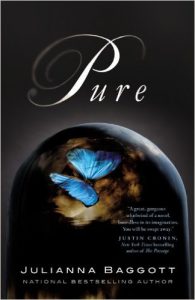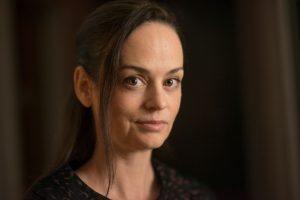
Critically acclaimed bestselling author Julianna Baggott—who also writes under the pen names Bridget Asher (The Provence Cure for the Brokenhearted) and N.E. Bode (The Anybodies)—has published more than twenty books, including novels for adults, younger readers, and collections of poetry. Her latest novel, Harriet Wolf’s Seventh Book of Wonders, was published in August 2015. Her novel, Pure, the first of a trilogy, was a New York Times Notable Book of 2012, and received the ALA’s Alex Award. Baggott’s most recent poetry collection, Instructions, Abject & Fuming, will be released later this year by Southern Illinois University Press.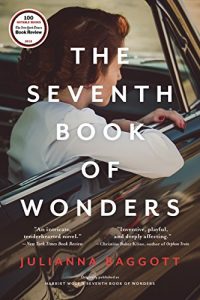
Her work has appeared in the New York Times, Washington Post, Boston Globe, Best American Poetry, Best Creative Nonfiction, Real Simple, on NPR.org and more, She’s a professor in the College of Motion Picture Arts at Florida State University and holds the Jenks Chair at The College of the Holy Cross. The mother of four children, Baggott and her husband co-founded a nonprofit called Kids in Need—Books in Deed, which gets books to underprivileged kids in Florida. For more, visit juliannabaggott.com.
The quick-witted Baggott visited Vermont College of Fine Arts on February 2, 2017 for a discussion about breaking into the world of freelance journalism through op-ed columns and essays, as well as a student Q&A session. Below are highlights from her presentation.
Julianna Baggott: I want to be of use to you all, so I’m mainly going to focus on op-eds and essays. I don’t have a book of nonfiction. It’s not mainly what I do. I don’t think of myself as an essayist or an op-ed writer, but I’ve written a number of them.
Part of it is built into the roots of my relationship with my husband and the practical aspects of writing for us. One of the things that we figured out early was how to freelance, and how to make money here and there. There were a few things we learned really quickly, because our food relied on it at this point.
The number one thing is that you do the editors’ job for them.
Editors constantly have to come up with ideas for copy. If you can come up with ideas, and pitch them things that are smart and good, that makes them like you very much. So, it was just like a constant stream of not being passive, but really being active in trying to find the stories that you want to write and then turning around and saying to the editor, “Here’s what I’d like to do.”
Being omnipresent is also important for a freelancer.
If there’s any way to physically be present, be present. Right now, I’m teaching a pitching class on how to pitch your stuff in LA to graduate screenwriters, and we actually culminate in going out to LA. But a lot of it is also about staying in touch with people naturally, engaging them even when you don’t have something to pitch, then having those rela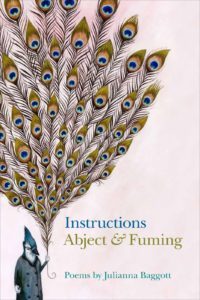 tionships build over time. There’s an old saying: you have to be two of three things: on time, likeable, or brilliant.
tionships build over time. There’s an old saying: you have to be two of three things: on time, likeable, or brilliant.
Especially in the freelance world, being likeable, being on time, being brilliant… if you can be all three, try to be all three.
One of the things that helped me a lot, mainly as an essayist, but also as a novelist, is to write a long answer to a question. A lot of times, in the essay in particular, you have a question and you’re going to show yourself on the page finding that answer. Usually with the op-ed you have more of a point of view, and you have more of something that you want to say that’s specific. So, the question is a really smart thing to think about.
The only advice that I actually believe in, that I give, that I really think actually holds up, is that a novel or any piece is much easier to write if you imagine whispering your story urgently into one person’s ear.
One person’s ear is important because you know exactly who your audience is. So one person’s ear is incredibly important. When you think about the op-ed, a lot of times you’re thinking about a wide readership; that’s gonna muddy your op-ed. You actually still have to think of that one person that you’re wanting to whisper your story to. It works for all those things, everything that I write. And I say ‘whisper it urgently’ because if you’re not urgent, then it’s probably not a story that needs to be 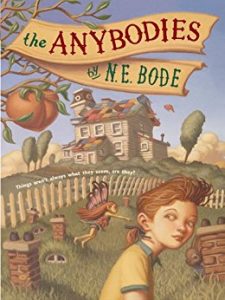 told. That’s another way to check it, to create that lens: the one ear and the question.
told. That’s another way to check it, to create that lens: the one ear and the question.
The nice thing is to answer the question, you have to believe in what you have to say, and you have to believe that you’re an expert in some way.
Every single one of you is already an expert in one thing, and that is your own experience in the world.
Only you know that, and that point of view is crucial to the op-ed or the essay. This is where you have to mine your material. What is your material? What are you attracted to write about? What is your terrain? Going after a market is really important: becoming the expert in what they are looking for. Getting to know certain markets, study them.
The first category you should think about is the evergreen essay.
As somebody who writes op-eds and looks for moments and opinions, I’m putting them in categories automatically. It’s horrible when an editor tells you that your essay is evergreen because it means she’s gonna put off running it until a slow news day. But it means that it doesn’t really have to hit in any specific news cycle.
The opposite of the evergreen essay is hitting the news cycle.
It’s really hard for a young writer because, a lot of times you’re thinking reactively, and so it’s hard for you to suddenly have a full cogent thought reactively. It’s hard for me to have a full cogent thought reactively. The thing about the news cycle though is that it’s a cycle. That’s the bad part about it. So, it’s really about you honing a piece: a point of view, a perspective, your take on something, and then being prepared for it. It’s not really hitting the news cycle and it’s not being reactive, because you’re preparing for it in advance.
Sometimes you have to be waiting for the accident.
Somebody asks you for something and you just have to be ready to say yes. Sometimes you judge your failures too quickly, and you just hear rejection, and you don’t listen to the other part of it, which is you’re onto something.
Especially the rejection of, ‘We’ve got something like this.’ That’s a great rejection. It means you’re onto something.
It means you understand the market. Make sure that you’re not taking rejection as a closing of the door. Sometimes it’s just the beginning of a relationship. Editors get so much that they can’t publish everything that they love, but they actually are interested in hearing your voice again. A lot of times there’s something there that they want more of. That’s something to think about.
Two websites I want to point out:
The Op Ed Project has a submissions page where I get a ton of information. You want to look at different markets so you’re hitting the people you want to speak to. Looking also at how to submit, how to pitch, who to reach out to, word count—it’s a great source of information on their submissions page.
For essays, I would look at the back of Best American Essays, just as a place to see what magazines they’re looking at, that they think would be good enough to have the best.
Q & A with VCFA students
Tierney Ray: How do you balance building a world in exposition, versus trusting the readers to build it as they read?
The most I did for world building in the strictest sense was Pure, because I had to create a post-apocalyptic dystopian world. There was a ton, and it really weighed down the first book. For people who love world building, in some ways you’re feeding that audience. In other ways, you are giving a great exposition. In anything in Sci-Fi, it’s incredibly speculative.
But after writing Pure, I realized how much world building is in every single book. You are always doing world building and it does weigh things down. So, writing the second book of the Pure Trilogy was great because I’d established world building and I could tear into the plot.
I would also say listen to the screenwriter, John August. He has a podcast called Script Notes and has one on world building, which is great. One of the lines I loved from that podcast was “remember that Harry Potter’s world exists to tell Harry Potter’s story.”
Remember, your world building works as service to the story.
My landscapes have to, in some way, exist and bow down to the story and the characters.
Breanne Cunningham: How do you balance being an artist and a mother, and still get the work done?
I actually have a six-week course on this topic. (Laughs) I have a very long answer for this. I have a talk on efficient creativity that I’ve given to a hedge fund in New York, but there’s a million different ways: Eat. Take snacks.
Writers are snackers. Glucose does go down when you use mental energy, it works as physical energy in your body, so have chocolate at your desk.
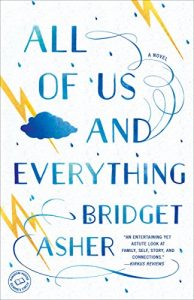 The one thing that I would say that is not just for people with kids, but for any other type of job or life that you have to balance, is that those jobs put you on these hamster wheel thoughts where you’re going, Did I pack the diaper bag? Do I have Cheerios? What was that weird rash? Should I call somebody about that? All of these things that weren’t getting me anywhere, but I was obsessively caught on them. So, one of the surprises having kids wasn’t that I lost my writing time, but that I was going to lose my ‘muse’ time. My best ideas and things I wanted to work on came when I was driving, taking a shower, chopping vegetables, or reading and phasing out while watching TV. So, that is what I lost and I had to be very aggressive about getting it back.
The one thing that I would say that is not just for people with kids, but for any other type of job or life that you have to balance, is that those jobs put you on these hamster wheel thoughts where you’re going, Did I pack the diaper bag? Do I have Cheerios? What was that weird rash? Should I call somebody about that? All of these things that weren’t getting me anywhere, but I was obsessively caught on them. So, one of the surprises having kids wasn’t that I lost my writing time, but that I was going to lose my ‘muse’ time. My best ideas and things I wanted to work on came when I was driving, taking a shower, chopping vegetables, or reading and phasing out while watching TV. So, that is what I lost and I had to be very aggressive about getting it back.
What happened in losing my muse time and having to be pressured to go after it,I learned this process of visualization I call “writing while not writing.”
My most important writing is done when I am not writing. I was never going to get my ten thousand hours Malcolm Gladwell popularized; I was never going to get that at a desk. I had to find it in other ways. So, there are many great things about the visualization process and writing in your head. Number one, I don’t write first drafts; I write fourth drafts.
You never really have to look at the blank page at all because by the time you’re free to write and can actually get to a computer, you already know what you’re going to write.
It’s already starting to run in your head. It was the pressure on not having time to write and having to find time to write that really made a difference. There is something to be said about pressure and being desirous and hungry.
Jennifer Kathleen Gibbons: You had an essay in Bustle about ‘suffering fools gladly’ in a workshop. Can you go into more detail about it?
Yes, suffer fools gladly. I see a certain type of person who comes to workshop and you can tell they respect two people in that workshop and they don’t respect anyone else… Sometimes it’s one… Sometimes it’s zero. (Laughs) So, the problem is that they’re not getting the best out of everybody. You have to be able to listen with a screen to every single person in that room, especially the person who doesn’t understand you and doesn’t get your work.
A lot of times, the one who says, “I don’t understand it, it doesn’t work,” the answer to [their] question isn’t ‘cut it out’. It’s, “Bring it! Do more of it!” You have to suffer fools gladly.
What more could I ask of a workshop but to have someone that is dedicated to writing and reading? What I look for is a good reader—make friends with people who are not writers, so you can create relationships with people who are not protective of their stories. I’ve gotten the best advice from people whose work I don’t like, and [with whom] I don’t get along, but we’re trying very different things and they’ve said something to me that has altered the course of the way I write for the better.
Gina Tron: Because you’ve written so many novels, did you ever find a formula for laying out the book you want to write?
Have you? Please, God, send it to me! (Laughs) In this way, it is like having children. Each child teaches you how to raise it. I wish there were one book that teaches you how to raise children. The problem is they’re all individuals. They’re unique with their own specific, weird shit. So, no, each book teaches me how to write it.
There is a confidence that comes with having written a novel before, having physically made it through one. And I can write with blind spots now. I can write not knowing what is in the box hidden in the wall. It’s going to be okay. So, there are certain things that I have gained confidence and gotten better at, mainly decision making. I’m a much faster decision maker in the middle of a novel because I’ve had to make more decisions.
I still write novels that fail; I write the whole thing and realize it failed, but I’m not done with it [because] I also have incredible confidence in my junkyard.
So there is the feeling that nothing is ever really wasted because I know I’m going to use those characters. So, there is confidence that comes with it, but no [formula].
For more information on Julianna Baggott, visit her website at juliannabaggott.com
jordan release date | nike air barkley posite 76ers shoes for women Maximum Volume DJ4633-010 Release Date – SBD

